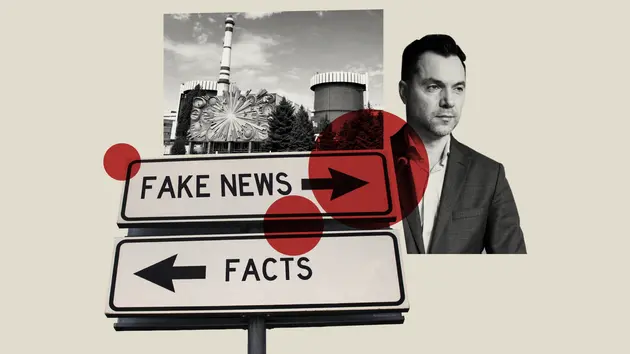Military Secret or Right to Know?

At the very beginning of the war, we agreed to a kind of social contract that only information from official sources could be trusted. However, these sources do not value their trust too much. Their information is very often refuted after some time — frequently by themselves, but without any attempt to apologize for the unreliability. Official sources and their information channels believe that they can afford to treat information freely, hide everything that can be hidden, and even lie outright — everything can always be written off as a “military secret.”
But where does the military necessity for general disinformation end and the simple habit of power to solve all its problems with lies begin?
The Ukrainian Energy Ministry has claimed that the fake story about the accident at the South Ukrainian nuclear power plant was “thrown into Ukraine’s information space by the occupiers.” All those who spread this fake should be brought to justice by the Security Service of Ukraine. Two days later it turned out that three transformers had burned down at the plant in three days. Either that or Ukrainian MPs began to speard Russian PsyOps. Together with Energoatom, which in a hurry dismissed the director of the plant — the “PsyOps victim.”
“In some divisions we had two, in some three or four people left, whereas by statute there were supposed to be from eight to 10,” said Yurii Sodol, the then commander of the united forces of the Ukrainian armed forces, in April 2024, describing the human resources disaster at the frontline, adding that the Russian army exceeds the Ukrainian army ten times in terms of the number of people on the front. And in the very early days of July, the incumber Ukrainian president claimed in an interview with Bloomberg that Ukraine had 14 “fully manned brigades” that only lacked weapons. Did either of the two officials say something untrue? If you look at subsequent personnel decisions, probably the first one. If you listen to the dynamics of replenishments at the frontline, one can’t be so sure.
The list of samples of dubious communication between representatives of the Ukrainian authorities and their citizens can go on ad infinitum.
The maxim that “the citizen has a right to know” has been edited by wartime. The president addresses the nation frequently and tastefully, but these speeches are numbers of the original genre and serve more to entertain than to inform. These speeches have no strategic significance; they are simply a collection of incidents from which it is impossible to draw a conclusion about the general state of affairs. But you can say a couple of phrases that will be quoted, turned into a scare and circulated on social networks, thus moving the conversation away from important and complicated issues and onto the crooked ways of rhetorical figures. Summaries of scattered individual cases are diluted with therapeutic assurances that “the situation is difficult but manageable.” No matter what happens in reality, our victory is inevitable — a lulling refrain.
As in the times of the late Soviet Union, we more often learn about important things from the Western media. For example, Ukrainians learned about the fact that with the support of its allies, Ukraine can “try to end the hot stage of the war by the end of this year” not from a telethon, but from Zelenskyy’s interview with the BBC. In a similar manner, we found out that Kyiv is launching detailed discussions with third countries to develop a roadmap for peace. “I have assigned this task to the Presidential Office and diplomatic teams. The plan will be ready by the end of November,” the Ukrainian president announced. Again, not during some evening televised address to fellow citizens, but in an interview with the Japanese TV channel NHK.
In some ways, this situation is reminiscent of the Perestroika period: Soviet citizens would often learn about Soviet President Gorbachev’s positions and plans from interviews given by Margaret Thatcher or from President George W. Bush’s speeches before the U.S. Senate. The idea of communicating important political information primarily to one’s own citizens in the Soviet government would have caused bewilderment. The current president’s office seems to think the same way.
It is not a given, of course, that the authorities are telling the truth to their “Western partners.” There are different versions of Ukrainian reality for each target audience — for external consumers and for internal ones. The fact that both can easily familiarize themselves with both versions does not confuse anyone. Media space is overloaded with information that contradicts each other — and everyone is used to it. Why not use this habit to your advantage?
“If we told the truth, everyone would scatter.” This statement from the time of the beginning of the war was not just a claim by the authorities of their right to lie. It also became a claim that this right of the authorities is exclusive. We have undergone a certain evolution: from the fascination with “freelance experts” like Oleksii Arestovych, who were convenient because, if necessary, the authorities could disassociate themselves from them and even “demote them from experts,” to the complete rejection of everything “independent,” including both international fortune hunters and all other “unauthorized” citizens. Besides, to share the right to lie is to share approval ratings. That’s how we’ve come to trusting “official sources” completely. The latter, even if they broadcast unverified information or outright lies, probably do it not for their own interests, but out of high considerations of state security and military necessity.
Many Ukrainians believe that this is generally correct: disinformation on the air is a military trick. This is how we mislead the enemy. However, in this situation, the distinction between the enemy and our own is blurred because everyone is misled at once. First and foremost, it is us who are mislead.
The substitution of honest information with therapy has not become less popular with the public since Oleksii Arestovych disappeared from the screens. It would seem that many people suffered from “holy lies” — both about “barbeque in May” and that “the war will be over in two weeks.” Injections of informational sedatives have cost us many lives because people misjudged the situation. And we have never received anything like an apology from our authorities for this lie and the wasted deaths it entailed. However, the majority of Ukrainians are still ready to agree that “the bosses know best” and on this basis to hand over the care of their own future to the “fathers of the nation.”
Ukrainians have always been great Taoists, and the war with its uncertainty has further weaned us off planning, thinking ahead and making choices. Life, of course, is unpredictable and there is some wisdom in not making God laugh by telling him about your plans. But this ultimately leaves us incapable of making the simplest of life choices. Wandering in the dark paralyzes the will. We become children, ready to hand over our care to “adults” who (we like to think) “know better” and “can do something about it.”
A strange thing has happened to us: we do not believe what the authorities say — and we have many reasons for it. But at the same time, we recognize their right to hide information from us and directly disinform us. A very peculiar situation has emerged, in which trust in the authorities and belief in their words do not intersect on the same plane. Such a situation already existed in our recent history — in the period of the late USSR.
The farther in time we get from the Chornobyl disaster, the more obvious it becomes that the collapse of the USSR began on those first May days (“spring barbeque” again, yes), when the Soviet government lied to both its own people and others that it had “everything under control.” At the same time, it was using lies to cover not “the honor of the country” or even the honor of its worn-out uniform, but the fact of its own impotence. The background radiation made both lies and powerlessness obvious — both to the consumer inside the “great country” and to the outsiders, who habitually looked at the once mighty geopolitical adversary with apprehension. The remnants of the benefit of the doubt burned up in a matter of weeks.
Fortunately, the accident at the South Ukrainian nuclear power plant did not come close to the Chornobyl disaster in terms of scale. But what unites both accidents is the reaction of the authorities. The first reflex — to hide the truth — turned out to be exactly the same. And the nature of this reflex, alas, is the same: lies are designed not so much to “prevent panic” as to cover up their own powerlessness in the face of a real challenge.
The full-scale war also has a high capacity for lies and powerlessness. And the price of “we can end the war by the end of the year without losing territory” therapy is getting higher and higher as the lies and powerlessness become more and more obvious.
As the history of the USSR has shown, lying does not remain the exclusive right of one group. It becomes the norm of life in an entire society, where the right of the authorities to lie to their citizens is paid for by the right of citizens to ignore their own state and its interests, the habit of doublethink, and the lack of a sense of unity with their country and society. We overcome this Soviet legacy in us slowly and jerkily in moments of social upheaval — revolutions and wars, that is, with a lot of bloodshed. But when the jerks come to an end, when the “horizontal” situation again completely passes into the hands of “official sources,” lies and distrust again become the norm.
Read this article in Ukrainian and russian.
Please select it with the mouse and press Ctrl+Enter or Submit a bug











 Login with Google
Login with Google